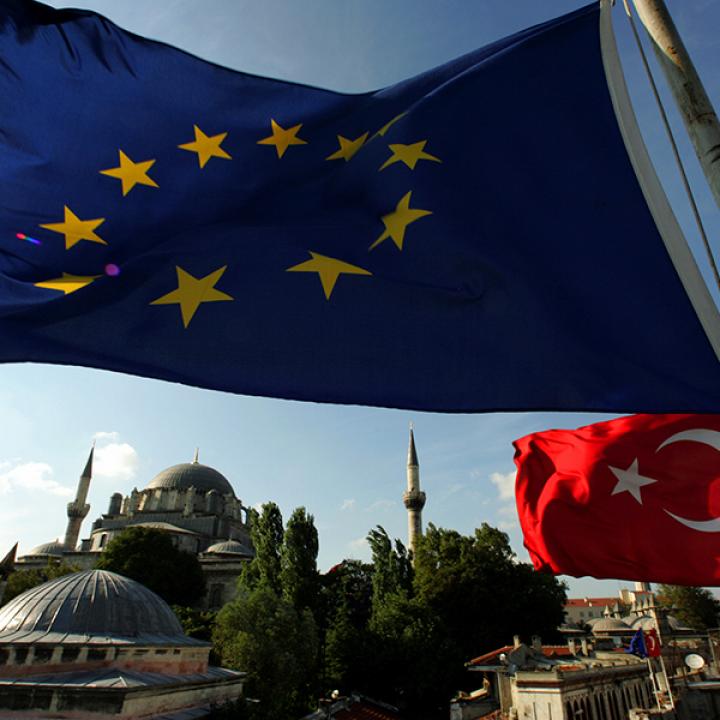

France and Germany need to realize that a genuine path to European Union membership is Turkey's surest path to greater democratization.
The Turks are increasingly hubristic, and not just in the Middle East. Having seen their total G.D.P. more than double in the past decade, many Turks do not feel that they need the European Union anymore. Turkey's economy is growing much faster than the European average, so the argument goes, why beg to be part of Europe's anemic Union?
Conversely, many Europeans are increasingly antagonistic toward Turkey's ongoing bid for European Union membership. Following the huge protests in Istanbul's Taksim Square last summer, in which millions took to the streets, only to be overpowered by the police, many have argued that Turkey is not a democracy and the Union does not need it.
Both are wrong.
For Turkey to continue its rise as both a regional power and a global player, it must re-embrace the European Union's liberal democratic values as accession negotiations resume. A Turkey that is a shallow democracy will not be welcome in Europe, nor can it serve as a role model for Arab countries.
And the European Union can help. Indeed, the hope of becoming a Union member has been the key driver of Turkey's democratization process for decades; the prospect of membership has provided an incentive for major democratic reforms. For instance, the European Union's 1999 promise to open accession talks with Turkey if it fulfilled the Union's political expectations led to the elimination of capital punishment and torture across the country.
When Europe shows a serious commitment to Turkey, it responds by liberalizing. In 2000, although public opinion had solidified in support of executing Abdullah Ocalan, jailed leader of Kurdistan Workers Party (known as the P.K.K.), the Turkish government, under pressure from Brussels, picked the possibility of Union membership over executing the leader of an organization that had killed thousands of people.
When Turkey's prime minister, Recep Tayyip Erdogan, came to power in 2002, he at first sought to prove his democratic credentials by aggressively pursuing European Union accession, and reforming his country with that goal in mind. Turkey adopted a liberal penal code and strengthened civilian control of the military, improving its democratic credentials and giving it a green light in 2005 for accession talks.
But Turkey will only reform itself when it believes the prospect of European Union accession is real. This explains why Mr. Erdogan's government cooled toward the idea of membership around 2005 and began to pursue blatantly illiberal policies at home, like intimidating and imprisoning journalists.
When the accession talks opened in 2005, Brussels made them a Sisyphean ordeal, creating 35 rounds, and requiring the consent of all (then 27) Union members to open and close each of these rounds. France and Germany simply did not want to have Turkey as a third power in Brussels. Because the European Union allocates voting power to its members based on population, if Turkey were to join the Union, its voting power would be greater than France's and just a bit less than Germany's.
Facing 35 rounds of talks involving 27 members meant that Turkey had to overcome hundreds of possible vetoes to gain membership. Countries opposed to Turkey's accession, like France, vetoed chapters at will. This rejection prompted Mr. Erdogan's pivot away from Europe and its liberal democratic ideals.
The European Union's recent progress report on Turkey's membership harshly criticized Mr. Erdogan's government. Yet, smartly, Europe has not pulled back, but moved closer. Leaders in Brussels are aware that Turkey will pivot further away if accession does not again become a reality. This would have devastating implications for Europe's growing community of restless Muslims, many of whom see Turkey's acceptance or rejection as a Union member as a test of whether there is room for them on the Continent.
And even the staunchest opponents of Turkey's accession are aware that Europe would be better off with a strong Turkey inside the Union, rather than a belligerent one outside it. After all, today's Turkey is no longer the "sick man of Europe." Its economy is poised to overtake the struggling Italian and Spanish economies in size in the coming years.
But Turkey has a window for reform that will not always remain open. Turkey's creative classes will flee, and those outside will avoid the country, if its leaders cannot provide unfettered freedom of expression, media, assembly and association, and respect for the individual, environment and urban space -- all key demands of the Taksim protesters.
Either the country will become a consolidated liberal democracy, taking off politically and socially, or it will remain a partial democracy, trapped where it is. A genuine path to European Union membership is the surest path toward democratization.
Soner Cagaptay, the Beyer Family Fellow and director of the Turkish Research Program at The Washington Institute, is author of the forthcoming book The Rise of Turkey: The Twenty-First Century's First Muslim Power.
New York Times


